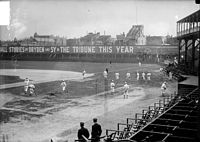Wrigley Rooftops: Difference between revisions
| Line 53: | Line 53: | ||
==External links== |
==External links== |
||
*[http://www.wrigleyrooftops.com/ Wrigley Rooftops] |
|||
*[http://www.sheffieldbaseballclub.com/ Sheffield Baseball Club] |
|||
*[http://www.wrigleyfieldrooftopclub.com/ Wrigley Field Rooftop Club] |
|||
*[http://www.ivyleaguebaseballclub.com/ Ivy League Baseball Club] |
|||
*[http://www.wrigleydoneright.com/ Wrigley Done Right Rooftop] |
*[http://www.wrigleydoneright.com/ Wrigley Done Right Rooftop] |
||
*[http://www.thecubdom.com/features/wrigleyrooftop_overview.html Wrigley Field Rooftop Directory] |
*[http://www.thecubdom.com/features/wrigleyrooftop_overview.html Wrigley Field Rooftop Directory] |
||
Revision as of 07:43, 4 May 2009
Wrigley Rooftops is a generic name for the rooftops of residential buildings which have bleachers or seating on them to view baseball games or other major events at Wrigley Field. Since 1914,[1] Wrigley roofs have dotted the neighborhood of Wrigleyville around Wrigley Field, where the Chicago Cubs play Major League Baseball. Venues on Waveland Avenue overlook left field, while those along Sheffield Avenue have a view over right field.
The rooftops had always been a gathering place for free views of the game, but until the 1980s, the observers were usually just a few dozen people watching from the flat rooftops, windows and porches of the buildings, with "seating" consisting of a few folding chairs, and with little commercial impact on the team. Once the Cubs returned to winning ways in the 1980s, formal seating structures began to appear, and building owners began charging admission, much to the displeasure of Cubs management, who saw it as an unreasonable encroachment.

Various methods of combatting this phenomenon were discussed. The idea of a "spite fence", as with Shibe Park in Philadelphia, or the Cubs' previous home, West Side Park, was discussed. The idea was not implemented, nor was it fully abandoned. Before Opening Day in 2002, a "wind screen" was temporarily erected on top of the ballpark's back screen behind the outfield wall, obscuring much of the view from Wrigley roofs. The Cubs had made their point, and progress towards a balanced relationship with the Wrigleyville neighbors would soon be achieved.
Legality
In 2002, the Cubs organization brought a lawsuit against the Rooftop Association for copyright infringement. Since operators of Wrigley roofs charge admission to use their amenities, the Cubs asserted that they were pirating a copyrighted game--normally a license would be paid for the privilege of viewing Major League Baseball--and sued for royalties.[2] In 2004, eleven of the thirteen roofs settled with the club out of court, agreeing to pay 17% of gross revenue in exchange for official endorsement.[3] The city also began investigating the structural integrity of the roofs, issuing citations to those in danger of collapse.
With the Cubs and the neighbors reaching agreement, many of the rooftops now feature seating structures: some with bleachers, some with chair seats, and even one with a steel-girdered double deck of seats (see photo).
The Cubs now endorse their "Official Rooftop Partners" on their team page at MLB.com.[4]
Notes
- ^ "Best Seats in House Are Outside Wrigley" (PDF). New York Times. 2005-06-12.
{{cite web}}: Check date values in:|date=(help) - ^ "The roof as a copyright infringement tool". 2002-12-22.
{{cite web}}: Check date values in:|date=(help) - ^ "Team to receive portion of rooftop revenue". ESPN.com. 2004-01-12.
{{cite web}}: Check date values in:|date=(help) - ^ http://chicago.cubs.mlb.com/chc/ballpark/rooftops.jsp
External links
- Wrigley Rooftops
- Sheffield Baseball Club
- Wrigley Field Rooftop Club
- Ivy League Baseball Club
- Wrigley Done Right Rooftop
- Wrigley Field Rooftop Directory
- Another Rooftop Directory
- List of Wrigley Rooftops
- A photo of the wind screen from Waveland Avenue



